
Recovery after laparoscopy will take a certain period of time, although not as long as in abdominal surgery. Its duration depends on the type of manipulation (diagnosis or treatment), the type of procedure (which organ was examined), the appearance of complications and may take 2-4 weeks. During this period, a series of different events does not stop in a person's life, including those related to the reason for taking alcohol. Therefore, patients often find out when alcohol can be taken after laparoscopy.
Attitude to alcohol during the recovery period after laparoscopy
| Type of laparoscopic surgery | Important Alcohol-Related Adaptation Features |
| Gynecological procedures | During the adaptation period after endovideosurgery, a woman has to deal with nausea and bloating. With the onset of pain, the doctor prescribes the use of non-steroidal anti-inflammatory drugs, and if an infectious-inflammatory focus is suspected, antibiotics. After laparoscopy of the ovarian cyst, a woman needs to drink hormonal drugs to correct the hormonal background. Therefore, drinks containing alcohol are allowed no earlier than after a month and a half, since medicines are absolutely incompatible with even small doses of alcohol. |
| Removal of appendicitis | Alcoholic drinks are prohibited after laparoscopic appendectomy, as they severely harm the liver, threatening the development of cirrhosis. In addition, ethanol causes inflammation of the mucous membranes of all digestive organs. Due to the danger of bloating and the appearance of flatulence, even the use of beer is prohibited, because the drink is a fermentation product, albeit natural. The result of increased gas formation can be dispersed seams, after how long you can taste alcohol, the attending physician decides in each case |
| Removal of the gallbladder | After laparoscopic cholecystectomy, patients have to significantly adjust not only their diet, but their entire lifestyle. The body should be helped to adapt to the special conditions of functioning, and taking some medications can become lifelong. Therefore, after the intervention, alcohol is not just not allowed, it is definitely contraindicated, because the organ that is responsible for the breakdown of alcohol has been removed. Without meeting all the doctor's requirements, a favorable outcome is in question |
For successful rehabilitation after any kind of laparoscopy, it is important to follow simple rules for the full recovery of the body. Even with a complete rejection of alcohol, life does not end, but acquires a new meaning, and the colors of reality become brighter.
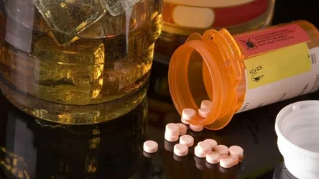
The time when the risks from taking ethanol are minimized
Drinking alcohol after surgery is undesirable. It is considered that after:
- abdominal surgery the first minimum dose of ethanol can be taken a month later;
- tooth extraction - after 2-3 days;
- appendectomy (for purulent appendicitis) - after 2-3 weeks;
- gynecological operations (for uterine fibroids or ectopic pregnancy) - after 4 weeks.
- plastic and cosmetic surgeries - after 3 weeks.
The time factor is influenced by the patient's age and physical condition. If the average abstinence time during appendectomy is 2-3 weeks, then in young people 25-30 years of age it can be 10-14 days, and in people over 35 years old - 1. 5-2 months.
If it is not possible not to take alcohol, it is better to check with your doctor about the approximate "safe" periods of abstinence. This applies, first of all, to the widespread operations on:
- spine for removal of herniated intervertebral discs, as well as tailbone injuries;
- rectum (for hemorrhoids);
- thyroid gland;
- joints of the limbs;
- prostate (for cancer or adenoma);
- testicle (varicocelectomy for varicocele);
- knee area (on the knee joint);
- leg veins (for varicose veins).
Alcohol affects differently
Unfortunately, not everyone listens to the advice of a tattoo artist. Hence, various kinds of consequences often arise. There is no harmless alcohol. Some people may think - what happens if I drink a bottle of beer or one glass of vodka? Let's take a look at how specific types of alcohol-containing drinks affect the body after getting a tattoo.
Fans of cognac and whiskey should refuse these drinks within a few weeks after the procedure. The fact is that they will have a direct effect on the blood vessels, expanding them. As a result, the image can become much dimmer, by about half. Damaged skin takes longer to heal, and the wound may bleed.
Drinking vodka after tattooing can cause the drawing to become distorted and blurry. The paint is washed out very strongly. As for the seemingly harmless beer, you will also have to refrain from drinking it. Foamy drinks contribute to a slight increase in blood pressure, which will affect the lymph, more precisely, the amount of its production.
Important! After consuming alcoholic beverages, a rough crust will appear on the skin for several days after the tattoo is applied. As a result, scars, scars or bumps may appear, which, even after complete healing of the skin, will not disappear.
Alcohol and anesthesia
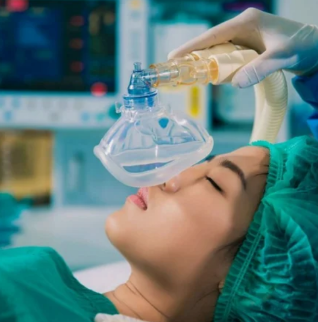
Anesthesia - loss of tissue sensitivity for a short period of time under the influence of anesthetic agents. Such drugs block the transmission of nerve impulses, due to which the signals do not reach the brain, which means that the body's response to irritation in the form of painful sensations is also absent.
Local anesthesia lasts an additional 2. 5 hours after surgery. However, when drinking alcohol, the anesthetic effect of the drug disappears instantly, an acute attack of pain develops, which cannot be muffled even with anesthetic drugs.
The situation is much more complicated with general anesthesia used in abdominal surgery, when the body needs to be protected from shock and pain.
After recovering from anesthesia, the following complications may occur:
- headaches;
- nausea;
- weakness or tension in muscles;
- discomfort in the throat;
- clouding of consciousness;
- drop in blood pressure;
- hallucinogenic delirium.
Why can't you drink alcohol after anesthesia?
This combination can lead to critical conditions such as anaphylactic shock and nervous disorders. The withdrawal period of anesthetic drugs depends on the type of drug, its dose and the patient's health. As a rule, the main part leaves the body within a day after the operation, and the residual within 2-3 days.

What can be the consequences
Not all antibiotics are created equal: some are mild and others more aggressive. Below are the groups of drugs that must be taken strictly according to the doctor's instructions, excluding any experiments with health:
- chloramphenicol;
- tetracycline;
- nitroimidazole;
- macrolide;
- cephalosporin;
- lincosamide;
- aminoglycoside.
Serious health problems are unavoidable if restrictions are neglected. The person is facing:
- heart attack;
- stroke;
- allergic reaction;
- tissue suppuration can turn into gangrene.
The drug Biseptol is similar in its action to disulfiram (it is used to code for alcoholism). If you mix it with alcohol, the patient's temperature rises, heart palpitations appear, accompanied by severe vomiting, headache. From vasospasm in the brain, hemorrhage can occur. As a result - a heart attack, coma or death.
Rules for drinking alcohol after removing the gallbladder
If a person after cholecystectomy does not feel unwell at first, this does not mean that alcohol is allowed. Especially in this case, the systematic intake of intoxicating drinks is dangerous. In many patients with a removed gallbladder, the body spontaneously reacts to alcohol with indomitable vomiting or severe pain. This is due to the fact that the digestive organs after the operation begin to work in extreme conditions.
Cholecystectomy itself forces many patients to reconsider their diet and get rid of bad habits. Only in this case is long-term remission possible and it becomes possible to live without constant pain in the hypochondrium.
After removing the gallbladder, it is most correct to completely forget about alcohol in any form and quantity. And there are a lot of patients who have managed to completely remove alcohol from their lives. However, not all people are able to completely stop drinking alcohol - after all, most of the traditions of Slavic culture are associated with the mandatory use of strong drinks.
Therefore, it is important to know what are the basic rules for drinking alcohol after removing the gallbladder, what you can drink in a similar situation and in what quantity. Restrictions such as:
can become a compromise between the title of "white crow" and harm to one's own health.Usually, removal of the gallbladder is associated with the development of chronic inflammatory processes in the bile ducts or liver. With such diseases, the absence of the gallbladder is not a reason to relax and start absorbing everything. In addition to alcohol, patients at least 2-3 years old are prohibited from taking fatty, fried, smoked and spicy foods. This period after cholecystectomy is considered restorative and is associated with special restrictions for the patient.
Removal of the gallbladder is performed very often, and after such an operation it is quite possible to live a full life. However, such an intervention imposes on a person the need to more carefully monitor their health, adhere to a diet and eliminate alcohol from life as much as possible.
Only in the case of a regulated lifestyle and refusal of addictions, a long-term remission with good health for the patient is possible. The need to severely limit or exclude alcohol does not prevent many people from living with pleasure, preferring to find genuine reasons for joy.
How much alcohol should not be drunk
Ethanol dilates blood vessels and increases blood circulation, which is very dangerous in the presence of an open wound in the mouth. Drinking can cause severe bleeding that can be difficult to stop.
After removal, a blood clot forms in the wound, which protects it from infection. With increased bleeding, it can wash out, then inflammation cannot be avoided. As a result - twitching pain, swelling, suppuration, fever. We'll have to go to dentistry again, clean out the pus, open the gums, and drink antibiotics.
In addition, ethanol can trigger an allergic reaction to the pain medication. No one can predict it, because each organism reacts to pain blockers in its own way. The most common manifestations: skin rash, itching, edema, difficulty breathing. Even anaphylactic shock is possible.
The period during which the use of strong drinks is prohibited is set individually. Before starting to drink, the patient must make sure that the wound is healed and no longer bleeds in case of accidental mechanical damage. The gums are healthy, there is no swelling, and when pressed, there is no soreness. There is no putrid purulent taste in the mouth.
Also, you need to wait until the anesthetic is removed from the blood. This process takes from a day to several days: the time depends on the injected dose, the individual metabolic rate, and the type of anesthetic. As a rule, by the third evening, traces of the drug in the blood no longer remain.
Tooth extraction is a relatively harmless operation, but even after it, some restrictions must be observed, especially if the doctor used anesthesia. You should be careful when drinking alcohol - even a small portion can provoke serious consequences.
The effect of alcohol on blood circulation
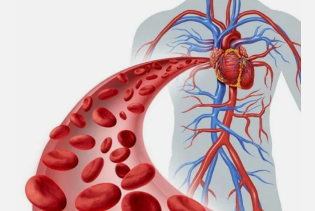
Surgery sometimes damages not only soft tissues, but also blood vessels that feed certain parts of the body. With a favorable outcome, they are restored, therefore, no organ suffers from a lack of oxygen and an excess of carbon dioxide.
Surgeons note that such an outcome is possible only with strict adherence to all recommendations regarding the recovery period. In particular, circulatory problems are likely if a person disobeys their doctor and drinks alcohol. Alcohol negatively affects the state of the vascular bed.
It is believed that small doses of alcohol have a beneficial effect on blood circulation, but this applies only to completely healthy people. After the operation, the situation is different.
Even a small amount of any of the strong drinks can be harmful. Doctors explain this by the fact that under the influence of ethyl alcohol, smooth muscle tissue undergoes a sharp contraction. In other words, the walls of arteries and veins turn into a state of increased tone. Their lumen narrows, and the speed of blood flow through them decreases.
As a result, the patient's blood pressure drops and the supply of oxygen to tissues and organs deteriorates. This means that healing after surgery will be slower, and the rehabilitation period will drag on indefinitely.
Dangers of alcohol before surgery
The presence of ethanol in the body is unacceptable not only after surgery, but also during preparation for it. Even if the operation will be performed with a modern method of endovideosurgery, which does not require standard cavity incisions. Drinking alcoholic beverages before surgery contributes to disruption of the cardiovascular system, which threatens heart failure with the likelihood of death.
In some cases, alcohol in the blood can cause problems with the action of anesthesia, the duration of which is short-term, without dulling the pain. Sometimes patients ask whether it is possible to drink beer or other carbonated drink before the intervention in the abdominal cavity. Such drinks before surgery contribute to irritation of the gastric mucosa with carbon dioxide, and in combination with ethanol and anesthesia, lead to gastrointestinal bleeding.
Even small doses of alcohol, taken before manipulation with the administration of anesthetics, cause a very difficult recovery from general anesthesia. Due to the symptoms of a severe hangover, doctors will have to bring the operated person to consciousness, fight with delirium tremens, and withdraw from the state of anaphylactic shock. Therefore, doctors warn that after laparoscopy, you can drink only clean water that does not contain carbon dioxide, and even more so - alcohol. Especially after endovideosurgery with the removal of an ovarian cyst, when antibiotics may be prescribed to a woman to protect against the possible development of inflammation.
Postoperative complications

According to medical statistics, the risk of complications in patients who drink alcohol before or after surgery is much higher. Ethyl alcohol and anesthesia are completely incompatible. Anesthesia is a temporary loss of tissue sensitivity under the influence of medicinal anesthetic substances. Their main task is to block the transmission of nerve impulses. As a result, the signals do not reach the brain, so the patient does not feel pain.
The effect of anesthesia after the operation lasts another 2-3 hours. If you drink a little alcohol after surgery, the effect of the pain reliever disappears instantly.A similar reaction can occur if alcohol was drunk before the operation.
In this case, additional anesthesia will not bring the desired result.
Any surgical intervention for the body is stress. Drinking alcohol after surgery can cause serious problems. Potential complications include:
- headache;
- clouding of consciousness;
- nausea;
- lowering blood pressure.
Ethyl alcohol has a negative effect on blood clotting. It makes it too thick. Erythrocytes in the blood stick together and form clots that clog blood vessels and small capillaries. Drinking alcohol after surgery can cause a stroke, heart attack, or hemorrhage.
Many alcoholics, having got to a hospital bed with a disappointing diagnosis requiring surgery, ask themselves the question: "When can you drink alcohol after surgery? "If anyone does not know when. And this is especially true during illness, including the pre- and postoperative periods. Today we will touch on the topic in more detail and find out the physiology of the effect of ethyl alcohol on the body, which has recently undergone surgery.
After surgery
After surgery, the patient's body needs long-term high-quality recovery. For this, a significant list of drugs is usually assigned to facilitate the process. Intoxicating roughly interferes with the recovery process, exerting both a direct negative effect on the body, the immune system, and interacting with medications.
Due to the fact that alcohol causes blood thickening, its intake even after surgical procedures is dangerous - it affects the veins, leads to dire consequences in the form of thrombosis of the vessels that have not yet recovered after the intervention of the surgeon. Depending on the concentration of alcohol, both the smallest capillaries and larger vessels can overlap, significantly slowing down blood circulation and recovery processes.
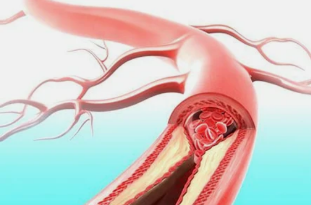
The liver and kidneys of an alcohol abuser experience serious difficulties in their work, often complicated by cirrhosis and other chronic diseases. In the postoperative period, the body is already under significant stress to remove the decay products of powerful drugs. Alcohol significantly increases additional risks.
The combination of alcohol and drugs in the postoperative time leads to a delay in the elimination of toxins from the body. The negative symptoms of this combination are manifested as follows:
- heart rhythm disturbances;
- difficulty breathing;
- increased sweating;
- dizziness;
- lowering blood pressure;
- rush of blood to the head.
Most often, to protect against postoperative complications, powerful antibiotics are prescribed, which are absolutely incompatible with any alcoholic product. Alcohol with general anesthesia has a depressing effect on the central nervous system, often leading to delusional states, hallucinations, and other manifestations of harm.
Alcohol during rehabilitation
As with other types of surgical procedures, drinking any kind of alcohol is especially dangerous after laparoscopy. This is especially true in the field of gynecology. Since after the manipulations of endovideosurgery associated with the appearance of postoperative pain and inflammation, patients are usually prescribed certain medications. Taking painkillers and antibacterial agents is incompatible with alcohol, it is strictly prohibited to use it.
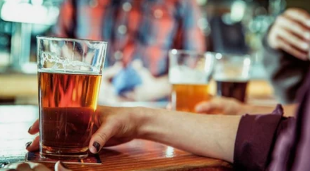
Reasons for banning alcoholic beverages after laparoscopy:
- instead of restoring immunity, the body will have to expend energy on removing alcoholic toxins;
- when treating an ovarian cyst with a laparoscopic method, if a woman drank even a little beer before the operation, this threatens her with inflammatory complications;
- taking alcoholic beverages together with nonsteroidal anti-inflammatory drugs leads to the death of hepatocytes;
- drinking alcohol after anesthesia slows down the regeneration processes, and also leads to exacerbation of latent ailments and chronic problems;
- causing vasodilatation, alcohol after anesthesia threatens internal bleeding, hemorrhage, may cause heart attack or stroke;
- alcohol strongly thickens the blood, which causes clogging of small capillaries with clumping erythrocytes, leading to the appearance of blood clots;
- the use of alcoholic beverages that depress the nervous system can provoke confusion, the appearance of a delusional state, and hallucinations.
Antibiotic rules
The most important rule of thumb for taking antibiotics is to only use them in situations where you cannot do without them. The indications for use are the symptoms of an acute bacterial infection, which the body cannot cope with on its own. To obtain the desired therapeutic effect, taking antibiotics cannot be indiscriminate.
It is imperative that you follow the instructions below:
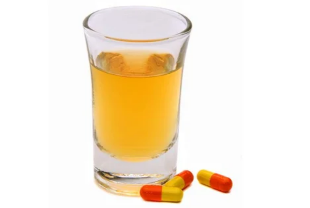
- You cannot prescribe an antibiotic on your ownif you do not have a medical background. Only a doctor will be able to determine the cause of the disease - a virus or bacteria. With a viral infection, antibiotics do not help; on the contrary, they can aggravate the course of the disease;
- Do not stop the prescribed course of treatment if you feel better.A relapse of the disease may occur;
- Do not change the dosage of the antibiotic during treatment. A decrease in dosage threatens that the bacteria will develop resistance to the drug, and an increase is fraught with side effects or overdose;
- Do not drink the antibiotic with tea, juice, and especially milk, otherwise taking the drug will be useless. Milk, dairy and fermented milk products are incompatible with antibiotics, they reduce the effect of the drug. You can drink the drug only with water, about 0. 5-1 glass;
- Do not take antibiotics at any convenient time.It is important to follow the instructions for the drug and use the drug as described, namely: before, during or after meals. In addition, it is important to observe the frequency of administration (1 time after 24 hours, 2 times after 12 hours, 3 times after 8 hours, and so on), to create the desired concentration of antibiotic in the body;
- Do not combine antibiotics with physical activity;
- Do not drink alcohol during the entire course of taking antibiotics.
Before prescribing an antibiotic, you must inform your doctor about the following:
- drugs currently being taken;
- pregnancy or lactation;
- kidney or liver disease;
- diabetes mellitus.
And also if observed before:
- occurrence of side effects;
- development of allergic reactions;
- recent use of antimicrobial agents.
























